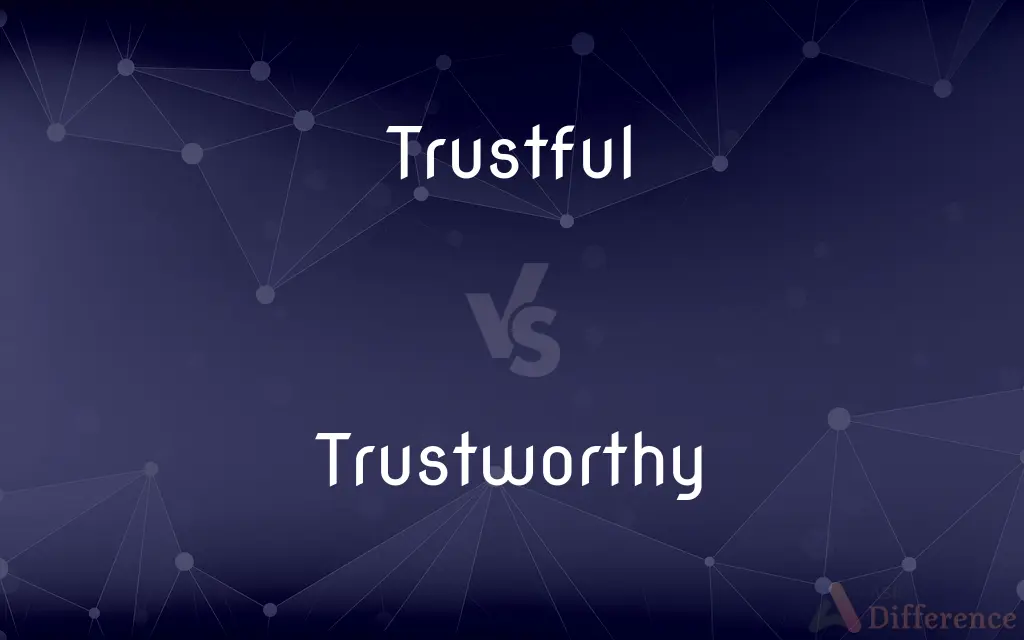Trustful vs. Trustworthy — What's the Difference?
By Tayyaba Rehman — Updated on October 25, 2023
Trustful means being full of trust, often naive; Trustworthy means being worthy of trust, dependable.

Difference Between Trustful and Trustworthy
Table of Contents
ADVERTISEMENT
Key Differences
Trustful often describes someone who places trust in others easily. It suggests a willingness or tendency to believe in the honesty or reliability of others without much skepticism. On the other hand, Trustworthy characterizes someone or something that can be relied upon with confidence. When one is described as Trustworthy, it implies that they have proven themselves to be honest or reliable over time or based on past actions.
Trustful can sometimes carry a connotation of naivety. A person who is overly trustful might be seen as gullible or lacking discernment. In contrast, Trustworthy doesn’t suggest naivety but rather elicits respect. A Trustworthy individual or entity has earned trust through consistency, reliability, and integrity.
It's important to note that while Trustful is an adjective applied primarily to people, Trustworthy can be used to describe both people and things. A person might be trustful of a story they heard, while a safe, a bank, or a source of information can be described as Trustworthy.
Trustful and Trustworthy, though related in the realm of trust, serve different linguistic and descriptive purposes. The former points to the one giving trust, while the latter points to the one deserving or earning trust.
Comparison Chart
Definition
Full of trust, inclined to trust others
Worthy of trust, reliable
ADVERTISEMENT
Primary Usage
Describes people
Describes both people and things
Connotation
Can imply naivety
Implies reliability and integrity
Trust Direction
Directed towards others
Directed towards the individual/entity described
Example
"She was trustful of strangers."
"The safe was considered trustworthy."
Compare with Definitions
Trustful
Full of trust in others.
Despite past betrayals, he remained trustful.
Trustworthy
Earning trust through actions or character.
His consistent honesty proved he was trustworthy.
Trustful
Lacking skepticism.
His trustful attitude made him susceptible to scams.
Trustworthy
Can be relied upon with confidence.
The data from the research was deemed trustworthy.
Trustful
Ready to believe in the goodness of others.
She had a trustful nature, always seeing the best in people.
Trustworthy
Reliable and dependable.
She was a trustworthy babysitter who always took great care of the kids.
Trustful
Accepting without doubt or question.
She was always trustful of the stories her grandfather told.
Trustworthy
Having a good reputation for reliability.
The brand was known to produce trustworthy appliances.
Trustful
Inclined to believe or confide readily; full of trust.
Trustworthy
Worthy of being confided in or believed.
He was a trustworthy source of information on the topic.
Trustful
Trusting; willing to trust.
Trustworthy
Able to be relied on as honest or truthful
Leave a spare key with a trustworthy neighbour
Trustful
(archaic) Trustworthy.
Trustworthy
Warranting trust; reliable.
Trustful
Full of trust; trusting.
Trustworthy
Deserving of trust, reliable.
Trustful
Worthy of trust; faithful; trusty; trustworthy.
Trustworthy
Worthy of trust or confidence; trusty.
Trustful
Inclined to believe or confide readily; full of trust;
Great brown eye, true and trustful
Trustworthy
Worthy of trust or belief;
A trustworthy report
An experienced and trustworthy traveling companion
Trustful
Confident in expecting the best.
The child's trustful eyes looked up at the teacher, hoping for praise.
Trustworthy
Taking responsibility for one's conduct and obligations;
Trustworthy public servants
Common Curiosities
Is Trustworthy used more positively or negatively?
Trustworthy is used positively, denoting reliability and integrity.
What does Trustful describe?
Trustful describes someone full of trust, often inclined to trust others.
What does Trustworthy refer to?
Trustworthy refers to someone or something that is reliable and worthy of trust.
Can Trustful imply naivety?
Yes, Trustful can sometimes imply naivety or a lack of skepticism.
Can both terms be used interchangeably?
No, Trustful describes someone inclined to trust, while Trustworthy describes someone or something deserving of trust.
Which word describes the one deemed deserving of trust?
Trustworthy describes the one deemed deserving of trust.
Are these terms antonyms?
No, they're related but have different focuses – one on the act of trusting and the other on being deserving of trust.
Can an organization be described as Trustworthy?
Yes, organizations, like businesses or nonprofits, can be described as Trustworthy based on their reputation and actions.
Can Trustworthy be used to describe things other than people?
Yes, Trustworthy can describe both people and objects, like institutions or tools.
Is being Trustful always a positive trait?
Not necessarily; being overly trustful can suggest gullibility.
Which word describes the giver of trust?
Trustful describes the giver of trust.
Is being Trustworthy considered an admirable trait?
Yes, being Trustworthy is generally viewed as an admirable trait indicating reliability.
Can a story or piece of information be described as Trustful?
Not typically. People are described as Trustful, while information or sources might be described as Trustworthy.
Is Trustful used for objects?
Trustful is primarily used to describe people, not objects.
Can a person be both Trustful and Trustworthy?
Yes, a person can be both inclined to trust others (Trustful) and be deemed reliable by others (Trustworthy).
Share Your Discovery

Previous Comparison
Swarthy vs. Tawny
Next Comparison
Bar vs. BurAuthor Spotlight
Written by
Tayyaba RehmanTayyaba Rehman is a distinguished writer, currently serving as a primary contributor to askdifference.com. As a researcher in semantics and etymology, Tayyaba's passion for the complexity of languages and their distinctions has found a perfect home on the platform. Tayyaba delves into the intricacies of language, distinguishing between commonly confused words and phrases, thereby providing clarity for readers worldwide.















































